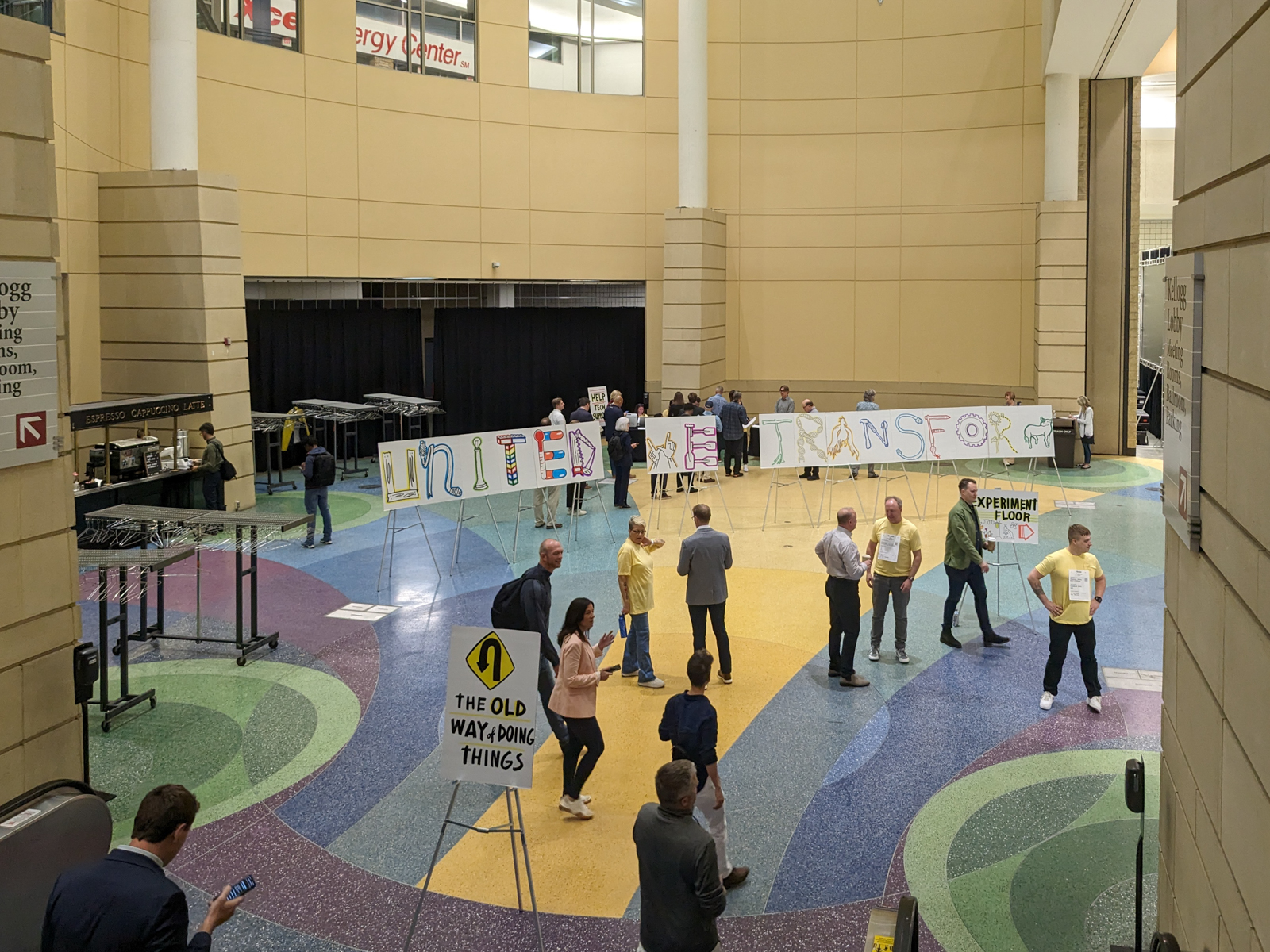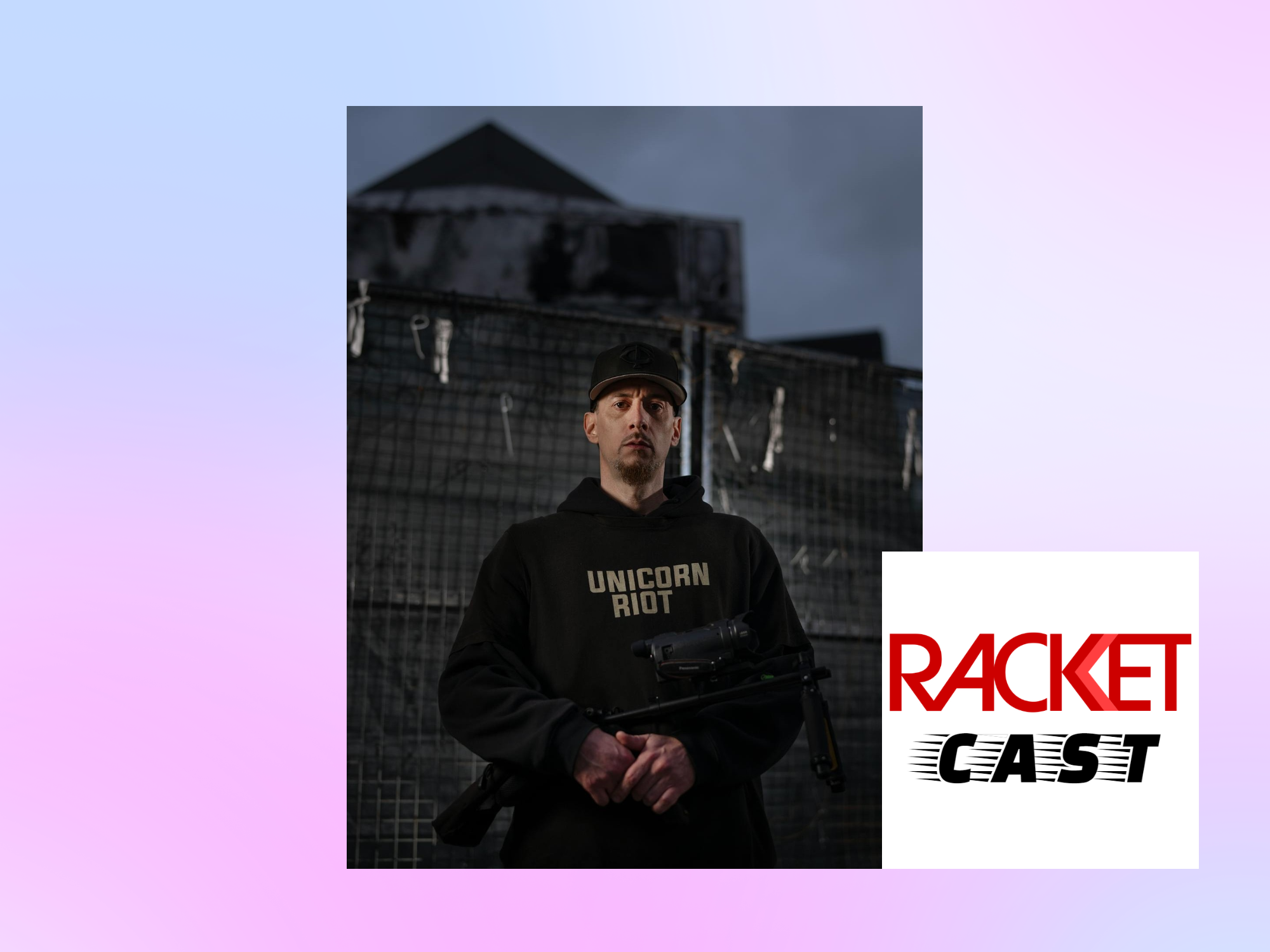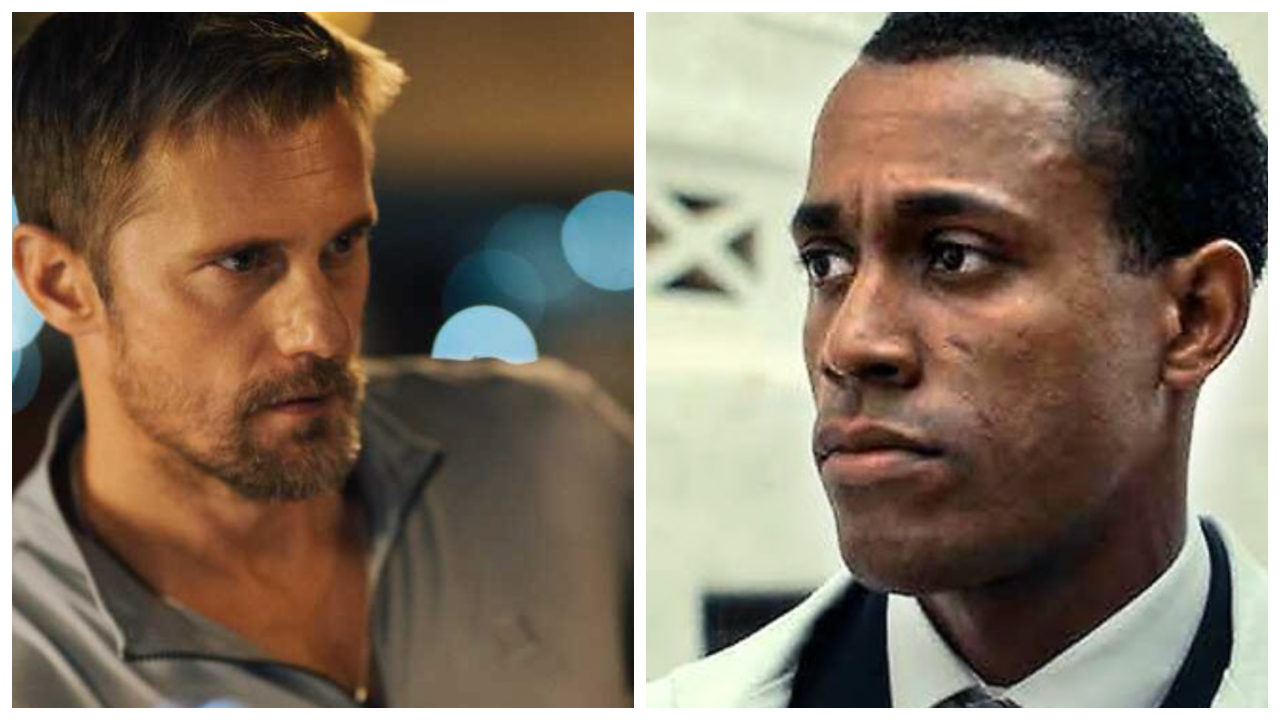The institutional might of the U.S. Air Force. The financial influence of the Minneapolis Regional Chamber of Commerce. The political clout of a big-city mayor and a sitting U.S. congresswoman. All of those forces coalesced Tuesday for United We Transform, an “audacious experiment” in “AI-powered” networking.
And yet, once inside downtown St. Paul’s hangar-like RiverCentre, you might think you’d arrived at a high school pep rally instead of a techy meeting of the minds. Descending the escalator to the conference floor, attendees were greeted with hand-drawn, letter-by-letter art that spelled out the event name. Folksy and charming, sure, but hardly a Steve Jobsian vision. The following signage shouted out to the morning’s reported 1,000 professionals (organizers had teased double that figure)...
"WELCOME TO THE GREAT MINNESOTA EXPERIMENT," read one, its scrawled font surrounded by cartoon vials, beakers, and atoms. "WHAT IF... IT WORKS?" read another, its bubbly marker text flanked by more generic atom clusters. Yet another sign advised folks committed to “THE OLD WAY OF DOING THINGS” to turn their asses around.

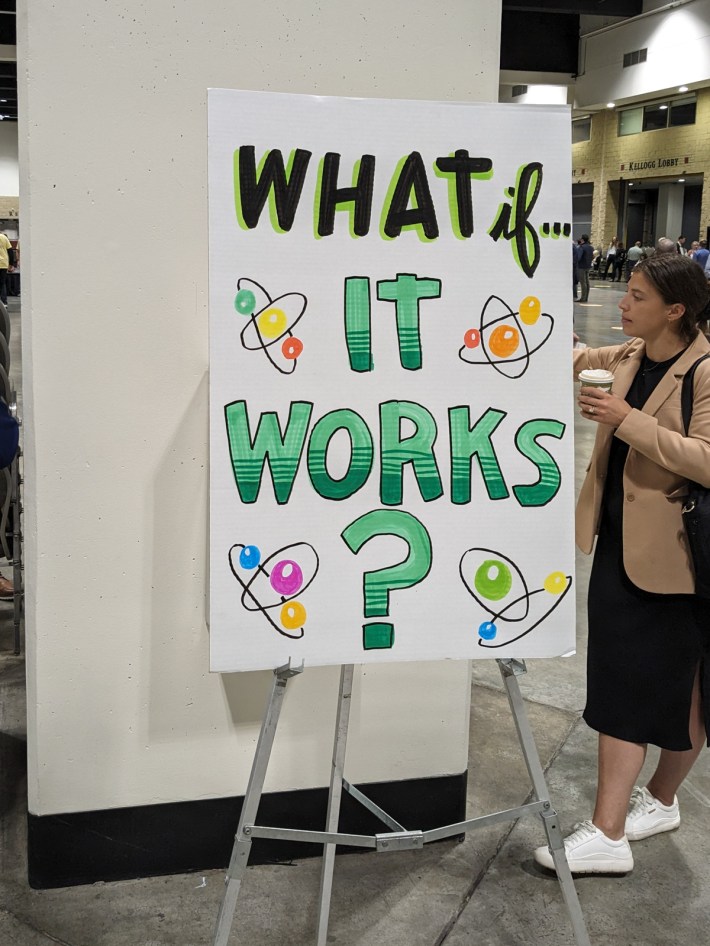

After all, UWT is meant for “the overly ambitious, organizers, intense, digital transformers, change makers,” who, following four hours of technology-supercharged networking, might just "create solutions for climate change, race division, business, real estate, sports, you name it." Bonus: My ticket also came with the promise of “10 meaningful connections,” and, failing that, the possibility of a full refund. Sounded like a bargain for $20.24—even with no food, drink, or “planet-polluting swag” included.
Tuesday morning’s chaotic registration process provided early ammo to the skeptics in attendance, though there appeared to be precious few. Color-coded card tables stacked with name-tag bibs were scattered across the concrete convention floor, but the introductory QR code meant to steer conference-goers to their specific table only brought up a black-and-white list of the alphabet. The 30-ish United We Transform helpers, mercifully apparent in their bright yellow T-shirts, demonstrated that the bullet-points ahead of each letter were actually unintuitive drop-down menus that, once clicked, informed me to approach the purple table.
Confusion abounded. Not an auspicious start!
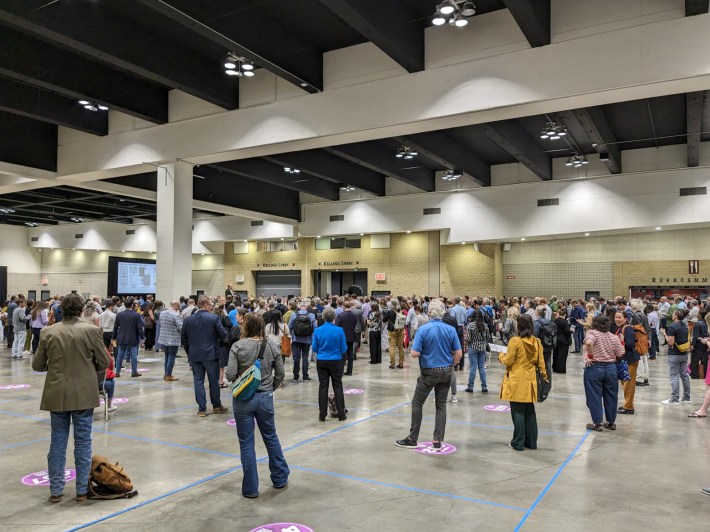
Before heading to floor square PURPLE 408, I secured a $4.50 small black coffee and took in opening remarks from host Brandon Klein, a partner with lead organizer Collaboration.Ai. “Silicon Valley is kicking our butts in almost every respect, but I think we can beat them in the next three years—with Minnesota Nice and Minnesota good,” he said, eliciting scattered “woos!” Thirty minutes later, after the first group sessions, he re-addressed the crowd with diminished enthusiasm.
“Now there's one big problem,” Klein admitted. “We're using ChatGPT or OpenAI, and when we said this was the biggest workshop for Minnesotans and by Minnesotans, we didn't realize that OpenAI could not handle 1,000 people at the same time… so, we still gotta do this."
Bizarre AI Bios For All
Is generative artificial intelligence the next Metaverse/cryptocurrency/NFT craze, a Silicon Valley-juiced hype bubble? With its under-scrutinized promises fanned by credulous media, is it poised to pop once giddy rounds of VC funding evaporate? All with the added bonus that, unlike those other techy trivialities, AI could pose a “risk of extinction” to humanity?
The United We Transform website doesn’t dwell on any of that. Instead, it flashes buzzy marketing-speak about ambitions to become "the State Fair to co-create our future." Industry-spanning community leaders—including Minneapolis Mayor Jacob Frey, U.S. Rep. Betty McCollum, and U of M School of Nursing Dean Connie Delaney—share their video testimonials. The important FAQ of "How is UWT funded and supported?" suggests a constellation of backers, some of whom apparently connected at the World Economic Forum in Davos: the U.S. Air Force, the U.S. House of Representatives, the Air Force-affiliated Digital Transformation Office, the Minneapolis Regional Chamber of Commerce, and Collaboration.Ai., among others. (Full disclosure: UWT purchased a $200 newsletter ad with Racket earlier this month.)
Most head-scratching is the section devoted to AI bios, ostensible flexes to demonstrate the power of this tech. Just a couple problems here. When browsing these bios, I noticed that several peers in the local journalism world appeared. They didn’t seem like AI networking conference types to me, so I asked them about their strangely worded profiles.
"What?! I had no idea this existed," one told me. "This has to be a scam, right?!"
"Holy shitbag reading that was weird," another said. "I knew nothing of the bio or event before your email. Thanks for letting me know."
"No [I wasn't aware], but it makes me sound pretty badass," said yet another. "Also, I don't think that's my real face... I'm so confused."
The unbeknownst bios, which could be read as effective endorsements, are sorta explained away with a disclaimer that reads, "We are using data that is 100% public. Advertisers and big tech use the same data without ever telling you... instead we are empowering you to put your data to good use to help Minnesota.”
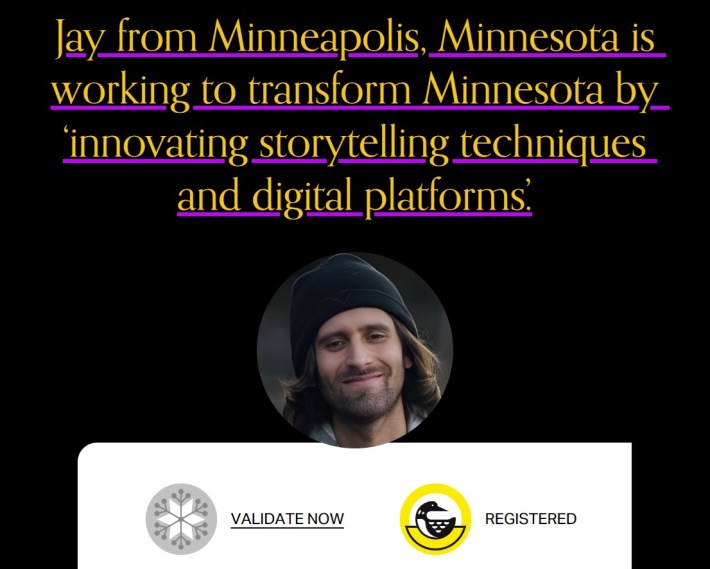
Apparently not important enough to be preemptively scraped up by the bots, I had to register for the event before my AI bio came to life. It’s… really bad and weird! See for yourself.
My face, clearly pulled from social media, is shellacked with an eerie digital sheen, while the sprawling text offers biographical details like “Jay will cut through ‘Minnesota Nice’ by sharing ‘their’ personality” and “Jay seldom expresses their reservations in a direct manner and might occasionally take you on a meandering verbal journey that doesn't arrive at a concrete decision.” Gee, thanks. The bots even took the time to show off how five of my skills align with the United Nations Sustainable Development Goals. Yet another disclaimer pledges that this “AI-generated perspective” can be trusted as 95% accurate.
My incoherent bio didn't inspire confidence, but surely all such glitches would be worked out before the main event…
“Weirdly Intimate” QR Code Networking
Back at United We Transform, my fellow PURPLE 408 colleagues represented a vast swath of the corporate world—3M, UnitedHealth, AmeriCorps, public media, and business consulting. We were asked to explain our biggest sources of pride (securing 35 magnetic recording patents, helping resettle Afghan refugees, etc.), our most difficult hardships (beating cancer, enduring layoffs, etc.), and name-check our heroes (Leonardo da Vinci, Gandhi, etc.).
Our name-tag bibs revealed even more professional details. Here’s mine:

Scanning those bib QR codes was touted as a more convenient way to exchange contact info than, say, business cards, although the process yet again proved glitchy and “weirdly intimate,” as we snapped away at each other’s torsos.
"Did you guys get your AI profiles?” one participant asked the group. “Mine had a picture that was not me; it was an employee I had like 15 years ago, and I’m all over the internet."
Generally, the session proved earnest and engaging, but skewed far closer to happy-hour chitchat than “transform[ing] the way you connect and collaborate.” The tech, again, mostly threw wrenches into the time-tested ritual of… meeting and talking to new people. Some lilies don’t need cyber-gilding.
Following the first workshop, Klein explained the stroke of AI genius behind what we’d just experienced. "We engineered those teams to have a less than 5% probability of meeting them in your lifetime—different silos, different industries,” he said. It seems like, in a room of 1,000 strangers, the chance-encounter odds wouldn’t be far from 5% if you just randomized the groups, but who am I to question the LinkedIn-hoovering bots? Maybe this is the future of meeting UnitedHealth middle managers and retired 3M tinkerers.
Highly Meaningful Connection Count: 0. The public media lady said something interesting about beavers solving climate change. Is that meaningful? Is it a connection?
NO KEYNOTES
As I learned during my day at the star-studded, get-rich-quick Jesus jamboree, presenters at large conferences over-share personal details to earn audience trust.
Klein shared an anecdote about his son suffering a severe allergic reaction to peanuts that, in a roundabout way, was meant to show the immense potential of AI. A photo of the poor kid’s hives outbreak was projected throughout the RiverCentre. Then, despite loudly advertised vows of "NO EMCEES,” "NO KEYNOTES," and “NO POWERPOINTS,” our de facto emcee introduced the first of three, er, let's just call them key speakers of note: former Pentagon man and current U.S. Air Force "innovation facilitator” Brian "Beam" Maue, Ph.D.
And you better believe Dr. Beam came with a PowerPoint presentation, featuring one slide—a graph titled "COMMIT: How to accelerate engaged Commitment"—that was dated 1982 (see below).
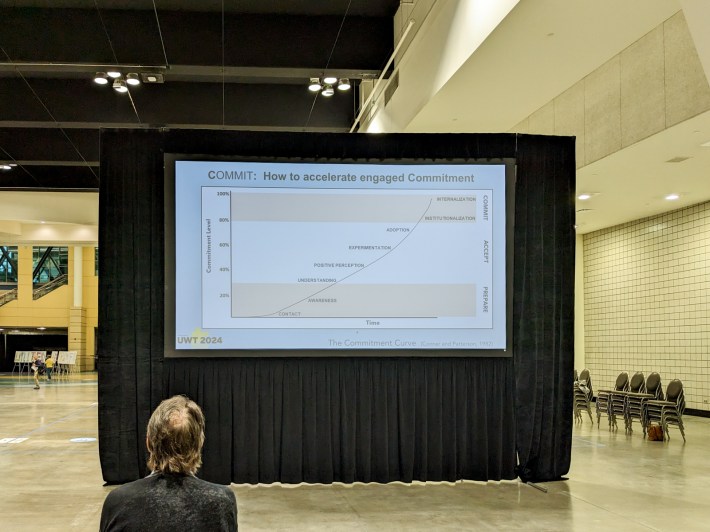
Maue rattled off the thorny logistics about renting air space to competing interests, all in service of achieving the very relatable goal of a joint international innovation contract for the Air Force and the Department of Defense. He concluded with a knock-knock joke.
Highly Meaningful Connection Count: 0. Maybe I’ll connect later with Dr. Beam on LinkedIn.
Mad Libbing Into the Future
To work around the “NO PANEL DISCUSSIONS” promise, Klein said the next workshop would involve all of us self-appointing as experts in dozens of areas.
"This is where we used AI to look at everything about all of you, and we created 160 topics that we know there are experts in the room,” he explained. “Is AI always right? No. If you don't like that topic, create a new topic together!"
Now, am I an “expert” at working from home? You could argue as much, considering Racket doesn’t have offices, so I chose the cement square representing “Remote Work” as ABBA’s “Dancing Queen” blared from the portable PA system.
My fellow WFH experts manned home offices for employers like 3M and Target, as well as for publishing houses and design firms. I broached what I considered to be a semi-shocking reveal—Klein telling us the AI couldn’t handle 1,000 participants—but that was met with an assurance that “it’ll catch up, it’ll learn” down the road. This was no place for AI heretics. These eager business people seemed unfazed by the hiccupping tech; most everyone in attendance slid naturally into the rhythms of a classic networking conference, content to be immersed in a tactile LinkedIn playground even if nothing felt all that cutting edge.
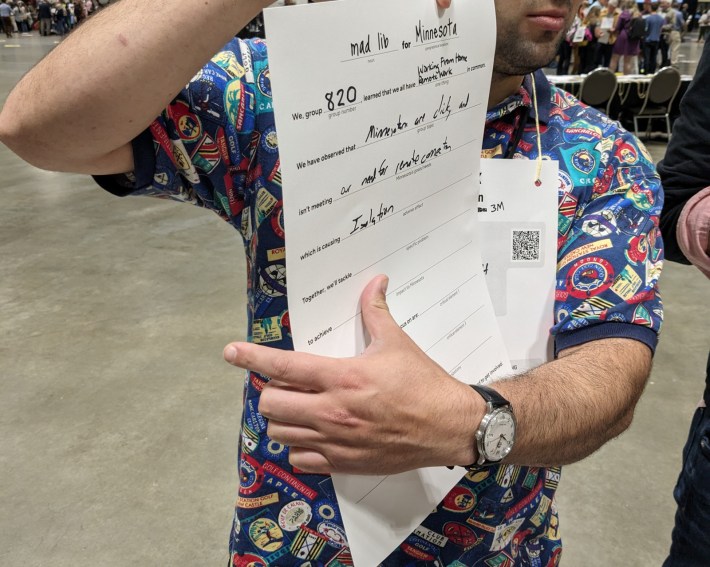
Our group quickly gelled around the task at hand: completing a jumbo Mad Libs-style paper sheet with various WFH strategies. The Sharpie part was easy, as the power of human teamwork propelled us down the list of prompts. But when it came time to scan the sheet’s QR code, our phones experienced loading wheels caught in perpetual spin cycles; a kind helper in a yellow shirt tried her best to help. Fun, well-worn chatter about the hotly debated pulse of Uptown and the social cliquiness of Minnesotans dominated our time together, and the charismatic Target lady graciously accepted the role of our supreme WFH expert for part two of the exercise.
Klein reemerged to tell us that the AI had predicted several topics would be unpopular, yet organizers included ‘em anyway. And, based on IRL participation, there were indeed some duds. "Thus humans were wrong and AI was right!" he concluded.
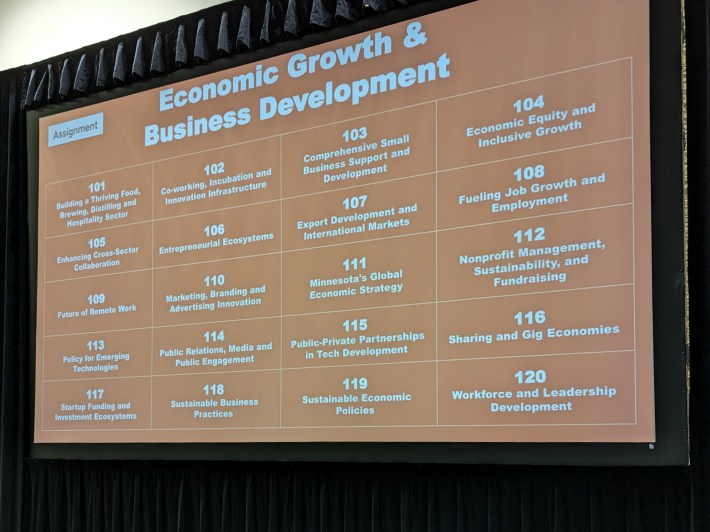
From there, we were instructed to choose between eight themes, each of which splintered into 20 subtopics, to hear the various supreme experts from the Mad Libs experiments deliver, more or less, panel discussions. The one I chose, something related to media and PR, quickly fractured into groups of two or three chitchatters. I spent most of the next 30 minutes gabbing with a data engineer.
He told me he used to scrape CityPages.com for data, and that his daughter had begun selling clothes online. I told him about the Serbian businessman/DJ who runs the zombie AI Southwest Journal, and that I heard Chanhassen is nice. I asked if he’s bullish on AI. "That's a really good question… I haven't really taken the time to think about that,” he told me. “At the end of the day, I'm probably more bullish only because it's creating opportunity." While we shared appreciation for the guy who bought BringYaAss.com and Prince’s 2007 Super Bowl halftime performance, I can’t say we learned much expert intel about media and/or PR. I ducked out early to use the squeaky-clean bathroom.
Highly Meaningful Connection Count: 0. Although I felt a spiritual connection with the B2B designer who “didn’t want to be here but my employer made me.” Alas, ships in the night…
“I’m Not Here Because I Understand AI.”
At around the two-hour mark, I decided to break the unspoken rules by unstacking a chair to accommodate my sitting needs. Lord, it felt good.
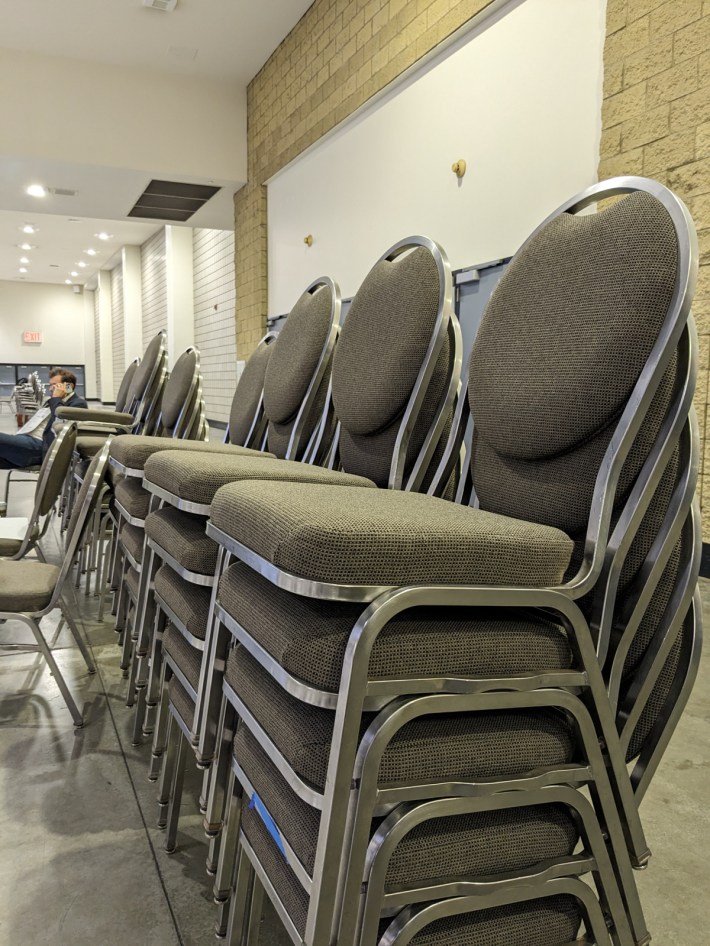
The next guest speaker (don't call it a keynote!) was introduced as being "no stranger to big, hairy problems": Minneapolis Mayor Jacob Frey, a man who once declared Minneapolis as "back" while outside of a stadium-sized NFT rally. (The NFT market would crater in subsequent months.)
"How many of you weren't so sure what you were getting yourselves into today?" Frey asked the crowd, spurring polite chuckles. "I am not here because I know a lot about technology. I'm certainly not here because I understand AI. In fact, I don't know what I'm talking about; I'm someone who still uses the term 'computer.'"
However, Frey said, "What I do recognize is this could bolster the way we work," adding that he was thrilled attendees took the time to "enhance their lives” at this first-of-its-kind gathering.
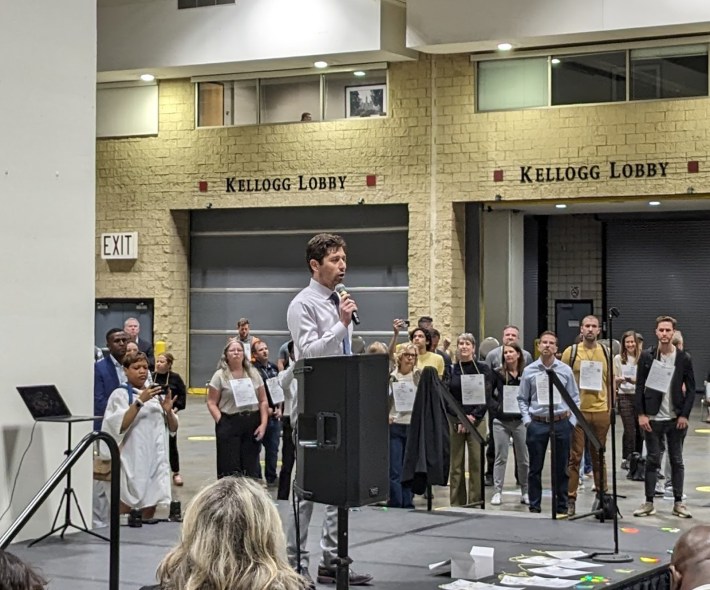
Back on stage, Klein was prepared to show off the valuable insights his AI engineers had already pulled from United We Transform. Again, the tech failed to rise to the occasion.
Klein was instructed to vamp as the data scientists plugged away. "Five minutes? I'm not going to be able to talk for five minutes..." he said, playfully exasperated. In the meantime he explained that, “There's a very decent chance more than half of you won't get your problem solved right now," but that once the AI finally spat out its new group formations, we’d be among those statistically most likely to help solve the challenges outlined at the bottom of our name-tag bibs. (Again, my challenge was and remains “Making $.”) Attendees were promised a “personalized email” report, possibly the first of its kind, that details all the connections and potential solutions we had encountered inside RiverCentre. We might not see ‘em until “later next week,” though.
With that, C+C Music Factory's "Gonna Make You Sweat (Everybody Dance Now)" hit the speakers, and, in concert with AI, I was off to solve all my problems.
Highly Meaningful Connection Count: 0. I would count the mayor, because he once managed to call my cell phone even though I’d never give his team my number, but that feels like cheating.
At Last, a Meaningful Connection!
Sure enough, though I’m hesitant to credit AI for this, my final group included two—two!—individuals who had at least heard of Racket. There was also a cybersecurity guy (he handed out paper biz cards), a renewable energy guy (he talked shit about big utility monopolies), and an older, delightful aquaponics guy (he warned me against eating most tilapia).
Could a Google Form asking for our professional fields ahead of United We Transform have grouped folks with a similar degree of accuracy? Impossible for me to say, but this much can’t be disputed: One Racket-enjoying member of the crew also happens to be a local journalism professor whose college maintains funds dedicated for internships; he suggested Racket might be in the mix for a genuine, bona fide, fully funded intern. Jackpot! My money woes, forever vanquished!
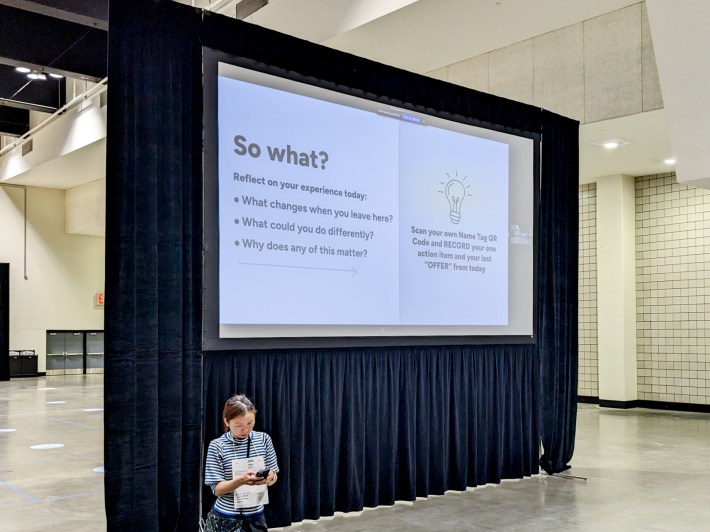
The conference concluded with a video message from U.S. Rep. Betty McCollum, who wondered aloud how AI might help our "dangerous world, with wars in Europe, the Middle East, and a return to competition between the geopolitical superpowers." The whole thing dwelled on opaque Department of Defense matters, again raising questions about who United We Transform is for and what’s happening to the data it generates. Further complicating things: Once back at my expertly run remote office (upstairs sofa), I read some fine print and learned that the advertised automatic refund of my $20.24 ticket was contingent on logging at least one contact into the buggy UWT interface. So it goes.
Even with those lurking war-machine concerns and that ticket-refund L, a fact as clear as the data on AI’s obscene energy demands resounded: New technology (might’ve) helped steer me toward someone who could (possibly and partially) solve (some of) my problems… for at least a couple months.
Highly Meaningful Connection Count: 1! I, for one, welcome our new AI overlords.
An hour before publication, we connected with UWT host/Collaboration.AI partner Brandon Klein by phone to chat about some of our findings...
- On the surprise journalist bios… “Mainstream journalism wasn't picking up on any of the issues we were trying to help with in Minnesota. So we made profiles for them, and we started that morning one-by-one sharing their profiles with them, and explaining the stuff behind it. When we got to the fifth person, our tech team had published all of them at the same time. All of a sudden, we had like three calls asking, 'What's going on?' We apologized. We made a mistake."
- On the persistent tech issues… “We couched the whole thing as an experiment, that if things broke along the way we'd still do our best. It didn't fully work. It mostly worked. We'll publish what we learned, in an open-source way—how we could make it better, all of that. Some people are pissed off, but it seems most people got value out of it. There's potential there."
- On the funding sources of UWT… “Especially in Minnesota, there's this kind of fear or skepticism of the Department of Defense. We're trying to break it open and get people to collaborate, whether that's the government or each of the industries represented on Tuesday. Government contracts are certainly part of the funding source."
- On my finding a highly meaningful connection… “That’s awesome!”
